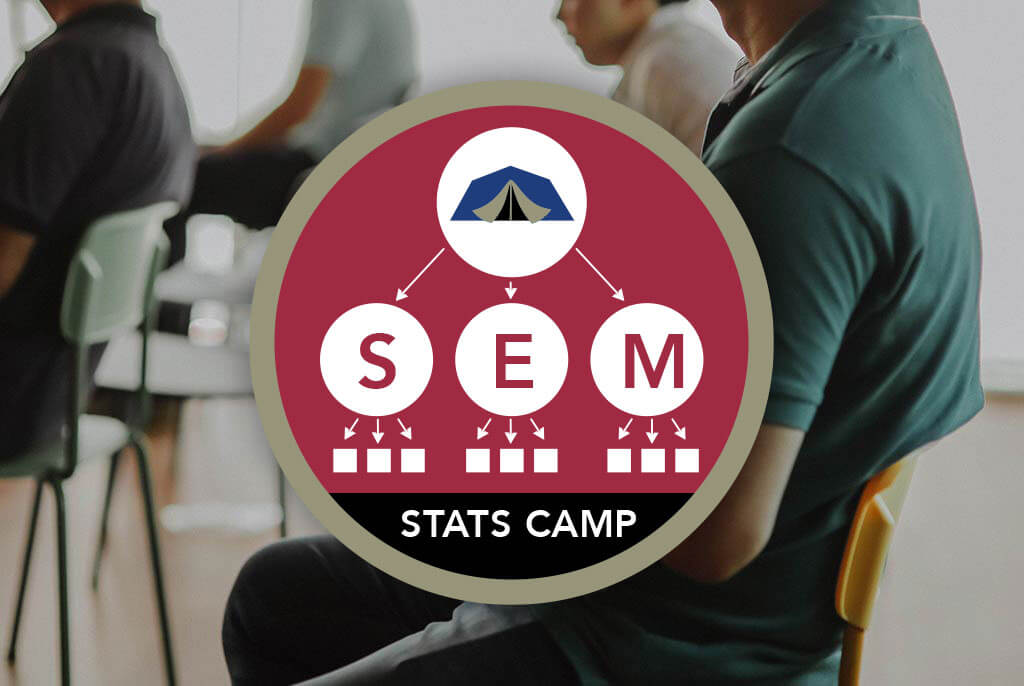Unlock your learning journey with flexible registration options! Choose the perfect fit for your schedule—from a single day to the full 5-day immersive experience. Opt for the comprehensive 5-day All-Access Pass and enjoy a special $100 discount off the daily rate of $195/day. Seize the opportunity to maximize your savings while diving deep into the rich content of each day. Select your preferred pass and embark on a transformative learning adventure!
LIVESTREAM / ASYNCHRONOUS – 5-day Statistics Short Course, 4hrs per day
Structural Equation Modeling Mastery: An In-Depth Training in Quantitative Methods
Ready to elevate your measurement game to the latent level? Look no further – you’ve discovered the essential foundation for mastering latent variable modeling: Structural Equation Modeling (SEM)! Many participants have shared that their previous training fell short or was outdated. Join us as we not only introduce you to the latest SEM techniques but also guide you through the precise steps to ‘craft’ a sophisticated SEM model. Upgrade your skills and stay ahead of the curve in this transformative learning experience!
Syllabus:
| Day 1 |
|
| 5:00 – 6:45 | Welcome and Introductions. Philosophy |
| 6:45 – 7:00 | Snack and Refreshment Break |
| 7:00 – 9:00 | Psychometrics; Defining Constructs |
| Day 2 |
|
| 5:00 – 6:45 | Identification & Scale setting |
| 6:45 – 7:00 | Snack and Refreshment Break |
| 7:00 – 8:00 | Confirmatory Factor Analysis I – Introduction to CFA |
| 8:00 – 8:30 | Confirmatory Factor Analysis II – Comparing Models, Model fit |
| 8:30 – 9:00 | Multiple-Group CFA – Testing for invariance |
| Day 3 |
|
| 5:00 – 6:45 | Multiple-Group CFA – Tests and comparing latent parameters |
| 6:45 – 7:00 | Snack and Refreshment Break |
| 7:00 – 8:00 | Parcels and Parceling; Missing Data & Power |
| 8:00 – 8:30 | Multiple-Group SEM |
| 8:30 – 9:00 | Catch up and Discussion |
| Day 4 |
|
| 5:00 – 6:45 | Latent Regression Models |
| 6:45 – 7:00 | Snack and Refreshment Break |
| 7:00 – 8:30 | Mediators |
| 8:30 – 9:00 | Catch up and Discussion |
| Day 5 |
|
| 5:00 – 6:45 | Moderators |
| 6:45 – 7:00 | Snack and Refreshment Break |
| 7:00 – 8:30 | Interactions Multi-Trait Multi-Method (MTMM) models |
| 8:30 – 9:00 | Catch up and Discussion |
Course Topics:
-
Advantages and disadvantages of SEM, Latent vs measured variables, Modeling with constructs, Figural conventions, Manifest vs latent test theory, Selecting indicators, Setting the scale, Model fit indices, Parceling, Invariance testing, Latent parameter testing, Phantom constructs, Sample size and power, Missing data.
Course Description:
Embark on a comprehensive journey with our 5-day short course delving into SEM Foundations & Extended Applications. Immerse yourself in an intensive exploration of the principles of structural equation modeling (SEM) with expert instructors Dr. Little and Dr. Stickley.
Instructor: Todd D. Little, Ph.D.

Todd D. Little, Ph.D. is a Professor of Educational Psychology at Texas Tech University (TTU). Little is internationally recognized for his quantitative work on various aspects of applied SEM (e.g., indicator selection, parceling, modeling developmental processes) as well as his substantive developmental research (e.g., action-control processes and motivation, coping, and self-regulation). Prior to joining TTU, … Little has guided quantitative training and provided consultation to students, staff, and faculty at the Max Planck Institute for Human Development’s Center for Lifespan Studies (1991-1998), Yale University’s Department of Psychology (1998-2002), and researchers at KU (2002-2013, including as director of the RDA unit at the Lifespan Institute and as director of the Center for Research Methods and Data Analysis). In 2001, Little was elected to membership in the Society for Multivariate Experimental Psychology, a restricted-membership society of quantitative specialists in the behavioral and social sciences.
In 2009, he was elected President of APA’s Division 5 (Evaluation, Measurement, and Statistics). He founded, organizes, and teaches in the internationally renowned ‘Stats Camps’ each June (see statscamp.org for details of the summer training programs) and has given over 150 workshops and talks on methodology topics around the world. As an interdisciplinary-oriented collaborator, Little has published with over 280 persons from around the world in over 65 different peer-reviewed journals. His work has garnered over 11,000 citations. He published Longitudinal Structural Equation Modeling in 2013 and he has edited five books related to methodology, including the Oxford Handbook of Quantitative Methods and the Guildford Handbook of Developmental Research Methods (with Brett Laursen and Noel Card). Little has served on numerous grant review panels for federal agencies such as NSF, NIH, and IES, and private foundations such as the Jacobs Foundation. He has been the principal investigator or co-principal investigator on over 15 grants and contracts and he has served as a statistical consultant on over 70 grants and contracts. In the conduct of his collaborative research, he has participated in the development of over 12 different measurement tools, including the CAMI, the Multi-CAM, the BALES, the BISC, the I FEEL, and the form/function decomposition of aggression.
Instructor: Zachary Stickley, Ph.D.
Zachary, Ph.D. is a senior research scientist at Yhat Enterprises LLC. where he pursues his research interests in measurement design, applied latent variable modeling, and modern approaches to missing data. Dr. Stickley has also served as an instructor and coordinator for the Stats Camp Foundation since first joining the team as a graduate student in 2018. He received his Ph.D. in Educational Psychology from College of Education at Texas Tech University with a focus on research methodology, measurement design, and statistical modeling. He received his Master of Education degree from Texas Tech University and his Bachelor of Science in Psychology from Tarleton State University.
APA Continuing Education Credits:
This course is NOT eligible for CE credits. You must attend a livestream or in-person event to qualify for APA continuing education credits. Please review our Summer Camp offerings for courses eligible for CE Credits.
Course Includes:
Materials, downloads, recorded course video viewable for up to one year.




